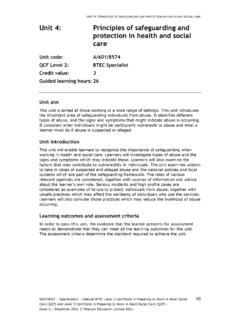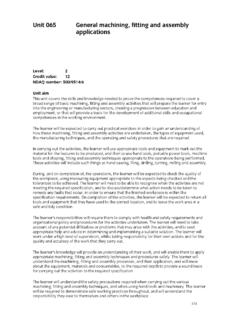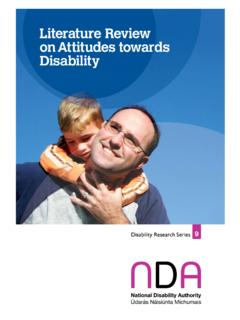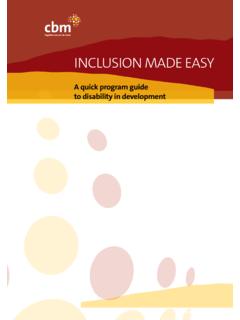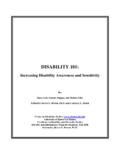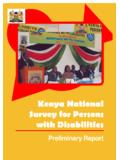Transcription of Unit 7: Understand How to Support Positive Outcomes for ...
1 N026023 Specification Edexcel Level 3 Diploma for children s Care, Learning and Development (QCF) Issue 1 April 2011 Edexcel Limited 2011 69 Unit 7: Understand How to Support Positive Outcomes for children and Young People Unit code: CYP Core Unit reference number: M/601/1699 QCF level: 3 Credit value: 3 Guided learning hours: 25 Unit summary This unit aims to provide members of the children and young person s workforce with understanding of the factors that can impact, both positively and negatively, on Outcomes and life chances of children and young people. It includes approaches to supporting Positive Outcomes including disability and specific requirements (additional needs).
2 Assessment requirements/evidence requirements This unit should be assessed in line with Skills for Care and Development s QCF Assessment Principles. Learners can enter the types of evidence they are presenting for assessment and the submission date against each assessment criterion. Alternatively, centre documentation should be used to record this information. N026023 Specification Edexcel Level 3 Diploma for children s Care, Learning and Development (QCF) Issue 1 April 2011 Edexcel Limited 2011 70 Unit content 1 Understand how the social, economic and cultural environment can impact on the Outcomes and life chances of children and young people Social, economic and cultural factors that impact on the lives of children and young people.
3 Factors eg impact of being in the looked after children system, living consistently in same parental home, relationship with parents or carer, attitude of parents or carer to education and a healthy lifestyle, poverty, poor housing, adequate/appropriate housing, level of access to community resources, being marginalised or excluded by society, discrimination and injustice, ethnic or cultural beliefs and customs, family expectations, health status, lack of opportunity and Support Impact of poverty on Outcomes and life chances for children and young people: poverty as significant threat to the health and wellbeing of children and young people; growing up in poverty can affect every area of a child s development, eg lack of opportunity and Support , inadequate access to resources, poor health, poor diet, poor quality of life, difficulties in social and emotional development, increased chance of accidents or illness, less likely to do well at school.
4 Long-term effects of poverty for the child or young person into adulthood eg long-term health problems, employment prospects, difficulties in building and maintaining Positive relationships, homelessness, crime Role of children and young people s personal choices and experience on their Outcomes and life chances: the negative impact of poor choices on all areas of development and wellbeing eg impact of smoking on health, repercussions of offending behaviour, impact of substance abuse, impact of aggressive behaviour 2 Understand how practitioners can make a Positive difference in Outcomes for children and young people Positive Outcomes for children and young people.
5 National Service Framework for children , Young People and Maternity Services, Flying Start, Foundation Phase, Extending Entitlement, children and Young People Rights to Action Designing services around the needs of children and young people: services more likely to be successful if they are child-centred or young-person-centred and relevant to the individual s needs, preferences, likes and dislikes; services that are targeted at individuals are more likely to achieve goal of supporting wellbeing and Positive Outcomes Importance of active participation of children and young people in decisions affecting their lives: active participation of children and young people in decision making can dramatically increase the service s chances of success.
6 Helps build self-esteem, accountability and independence in child or young person N026023 Specification Edexcel Level 3 Diploma for children s Care, Learning and Development (QCF) Issue 1 April 2011 Edexcel Limited 2011 71 Support children and young people according to their age, needs and abilities to make personal choices and experiences that have a Positive impact on their lives: encouraging children and young people to think about consequences of choices or behaviour; offer accurate and easy to Understand information about possible consequences of their choices or offer access to such information as necessary; be a Positive role model; plan and/or facilitate age-appropriate activities and experiences that take advantage of current interest or issues of children or young people.
7 Use of different types of activities eg discussion groups, circle time activities 3 Understand the possible impact of disability, special requirements and attitudes on Positive Outcomes for children and young people Potential impact of disability on Outcomes and life chances of children and young people: potential impact eg discrimination, lack of choices or opportunities, decreased accessibility, low self-esteem or confidence, depression, poor disposition to learning; Positive attitudes towards children and young people with disabilities can have significant impact on Outcomes ; importance of focusing primarily on the child or young person as a human being and seeing the disability as secondary; importance of working to minimise the impact of the disability in order to enable the disabled child or young person to lead as normal a life as possible Social model of disability and its impact: idea that disability is caused by the way society is organised, not caused by the child or young person s disability.
8 Emphasises ways of removing obstacles which restrict life choices for children or young people with impairments or differences Medical model of disability and its impact: idea that disabled children or young people are defined by their medical condition or illness; disabled child or young person should be helped to fit into society rather than society be encouraged to change in order to meet the needs of disabled child or young person; medical model strongly rejected by organisations representing disabled people Support available for disabled children and young people and those with specific requirements: appropriate to the needs of the individual eg speech and language therapy, Support form health professionals, assistive technology, specialised services.
9 Responsibility of social services to provide a range of services to Support families with disabled children to minimise the impact of any disability eg short-term breaks, respite care, Support services in the home, assistance for children and young people to participate in out-of-school activities alongside their peers N026023 Specification Edexcel Level 3 Diploma for children s Care, Learning and Development (QCF) Issue 1 April 2011 Edexcel Limited 2011 72 4 Understand the importance of equality, diversity and inclusion in promoting Positive Outcomes for children young people Equality, diversity and inclusion in the context of Positive Outcomes for children and young people: children and Young People: Rights to Action current legislation eg the children Act 2004, Disability Discrimination Act 2005, the Equality Act 2010; equal opportunities policy of own setting.
10 Support services use the social model of disability and work towards removing barriers which restrict life choices for children and young people; services planned according to the individual child or young person s needs and abilities in order to maximise chances of success; all practitioners should have a child-centred or young person-centred approach; child or young person needs to be involved in decision making as appropriate for their age and abilities N026023 Specification Edexcel Level 3 Diploma for children s Care, Learning and Development (QCF) Issue 1 April 2011 Edexcel Limited 2011 73 Learning Outcomes and assessment criteria Learning Outcomes Assessment criteria Evidence type Portfolio reference Date 1 Understand how the social, economic and cultural environment can impact on the Outcomes and life chances of children and young people describe the social.


